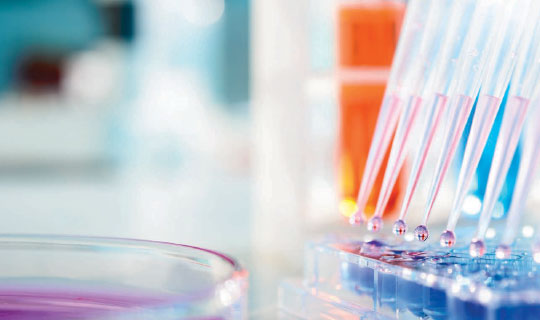
Working together, top specialists with a range of expertise find precise therapies for each patient’s unique disease.
Every three minutes, someone in the U.S. is diagnosed with a blood cancer. Despite this prevalence, however, blood cancer specialists know that individual cases will vary widely.
“There’s a bit of a paradox,” says Matthew Matasar, MD, MS, Chief of Blood Disorders at Rutgers Cancer Institute of New Jersey and RWJBarnabas Health (RWJBH). “Blood cancers are relatively common but are very complicated illnesses, with dozens of kinds of leukemia, more than a hundred kinds of lymphomas, multiple myeloma and so on. A diagnosis of blood cancer requires a lot of medical sophistication brought to bear on a unique illness in the context of a patient’s unique life.”

Such diagnoses require extensive collaboration. “That’s best done at a National Cancer Institute-designated Comprehensive Cancer Center like ours, which has the most resources, greatest expertise and greatest ability to deliver sophisticated and personalized care,” Dr. Matasar says. Rutgers Cancer Institute together with RWJBH is one of only 54 NCI-designated Comprehensive Cancer Centers in the U.S. and the only one in New Jersey.
Blood cancer and hematologic malignancy specialists at Rutgers Cancer Institute collaborate closely with peers throughout the state at the RWJBH facilities. “Oncology is a team sport,” says Dr. Matasar. “We have numerous weekly meetings to review, confirm, plan and review again. We draw from a wide range of specialties to get the benefit of many areas of expertise.”
As a result, every patient’s case receives multiple reviews by multiple experts. “Patients can feel confident that the treatment plan being developed is personalized to be as successful as possible,” Dr. Matasar says.
Systemwide Access
Patients at Rutgers Cancer Institute and RWJBH facilities have access to advanced and novel treatments, many of which are not available elsewhere. The full spectrum of therapeutic procedures and advanced treatment options for all blood cancers includes clinical trials, immunotherapy, CAR T-cell therapy, blood and marrow transplantation and other cellular therapies.
As an NCI-designated Comprehensive Cancer Center, Rutgers Cancer Institute and RWJBH together provide access to cutting-edge, high-impact clinical trials. “We have numerous clinical trials for patients with blood cancers including several innovative trials that are important to patients with a diagnosis of lymphoma,” says Dr. Matasar.
One trial is investigating CAR T-cells. “These are bioengineered T-cells taken from a patient and modified to be given back to the patient as a living therapy,” Dr. Matasar says.
A second trial is researching a therapy called bispecific antibodies. “These attach onto the surface of a cancer cell but also drag nearby healthy immune cells to those cancer cells and stimulate them to attack the lymphoma,” Dr. Matasar says. “Rutgers has been at the vanguard of both CAR T-cells and bispecific antibodies, and has contributed to these treatments becoming FDA approved. We’re now working diligently on developing the next generation.”
Thanks to systemwide collaboration, patients at RWJBH facilities and Rutgers Cancer Institute have access to such advanced treatments close to home. “If a patient requires access to a treatment that’s not available at a given site, they can be transferred elsewhere within the system, and a partnering oncologist will collaborate with their local oncologist,”Dr. Matasar says. “We’ll do whatever it takes to be sure patients get the treatments they need.”
A Holistic Approach
Blood cancers can vary widely, which is why it’s important to receive care at a center like ours where knowledge and experience are vast and services are in place to support patients—both physically and emotionally, Dr. Matasar notes.
“Because of our expertise and extensive experience, chances are we’ve been there and done that,” he says. “We can tell our patients, ‘We’ve got you.’ Often, we can connect them with patients and survivors who have faced a similar challenge.”
The blood cancers team offers patients resources for every stage of their cancer journey. An oncology nurse navigator assists them through the entire process, from diagnosis through survivorship. As needed, patients have access to genetic counselors, nutritionists, exercise physiologists, rehabilitation experts, and experts in managing treatment side effects and post-therapy recovery.
“We are not here to deliver yesterday’s care,” Dr. Matasar says. “We are delivering tomorrow’s care today and are transforming cancer care to give patients the best possible chance for successful outcomes. It’s a tremendous privilege and honor—and our team brings focus, dedication, commitment and passion to the work each and every day.”
A New Leader in Cell Therapy and Bone Marrow Transplantation

Adrienne Phillips, MD, MPH, has been named Director of Cell Therapy and Bone Marrow Transplantation, Northern Regions at Rutgers Cancer Institute of New Jersey and RWJBarnabas Health. She joins the Blood and Marrow Transplant and Cellular Therapies program, the only program in New Jersey that is part of a National Cancer Institute-designated Comprehensive Cancer Center and one of the only programs in the state certified to perform autologous (from the patient) and allogeneic (from donors) stem cell transplants.
Dr. Phillips specializes in treating rare but fast-growing and aggressive cancers caused by the HTLV-1 virus, which disproportionately impacts Caribbean and Latino Americans. “I am incredibly excited to be able to build on the Blood and Marrow Transplant and Cellular Therapies team’s strong tradition of excellence and expand this care to our Northern Region facilities to further the way we deliver compassionate care to the patients of New Jersey and beyond,” she says.
New Hope For Young Patients

“My vision is to offer stem cell transplants and cellular therapies to our pediatric blood cancer patients near their homes, eliminating the need for pediatric patients and their families to travel far or out of state for treatment,” says Niketa C. Shah, MD, Chief of Pediatric Bone Marrow Transplantation and Cellular Therapies at Rutgers Cancer Institute of New Jersey and RWJBarnabas Health.
Dr. Shah oversees the Pediatric Stem Cell Transplantation and Cellular Therapies Program at Rutgers Cancer Institute in collaboration with The Bristol-Myers Squibb Children’s Hospital at Robert Wood Johnson University Hospital. The program offers children, adolescents and young adults the most advanced treatment options for blood cancers, including stem cell transplants, gene therapy and immunotherapy.
Dr. Shah works with a skilled team including physicians, advanced practice nurses, social workers, pediatric psychologists and more, all providing lifesaving treatments close to home.
Blood Cancers: What to Know
- What They Are: Blood cancers, also called hematologic malignancies, are cancers of the immune system. Abnormal immune cells grow out of control, interfering with the infection fighting function of the normal immune system. Three main types of blood cancers are leukemia, lymphoma and myeloma.
- Risk Factors: These vary but include advancing age, gender (being male) and a compromised immune system.
- Symptoms: Fever or chills; persistent fatigue or weakness; unexplained weight loss; bone/ joint pain; bleeding or easy bruising; and more.
- Diagnosis: May include physical examination, blood tests, body scans and biopsies.
RWJBarnabas Health, in partnership with Rutgers Cancer Institute of New Jersey—the state’s only NCI-designated Comprehensive Cancer Center—provides close-to-home access to the most advanced treatment options. Call 844-CANCERNJ or visit Cancer Services.
 View full issues of Healthy Together magazine by New Jersey region:
View full issues of Healthy Together magazine by New Jersey region: